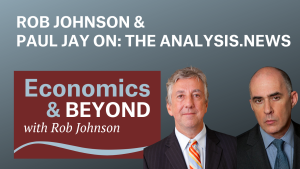Inflation targeting insufficient: central banks and governments must manage the quantity and mix of credit created
FRANKFURT, 10 February 2014 — Financial reforms introduced since the crisis have been valuable but still have not addressed the fundamental driver of economic and financial instability – continually rising levels of private debt, Adair Lord Turner, former chairman of the United Kingdom Financial Services Authority, said Monday in a speech at Goethe University. Lord Turner is a Senior Fellow at the Center for Financial Studies (CFS) at the university and at the Institute for New Economic Thinking, an economics research and education foundation based in New York.
“Over several decades prior to 2008, private credit grew faster than GDP in most advanced economies and leverage therefore grew. That was a major cause of the crisis and the main reason why the post crisis recession was so deep and the recovery so slow and weak,” Turner said.
But this rapid credit growth seemed essential to achieve adequate economic growth, facing us with a severe dilemma – can we grow in a more stable fashion or is economic growth bound to generate harmful instability?
Turner argued that growth has been so credit intensive because free financial systems suffer from self-reinforcing tendencies to create private debt contracts that are not sustainable in the light of reasonable assessments of borrower cash flow, and which are not essential to the growth process. The consequence, Lord Turner noted, is that high levels of private leverage leave economies vulnerable to dangerous self-reinforcing debt deflation cycles.
“To achieve long-term stability, we will need to address these fundamental drivers of the crisis and the post-crisis recession,” Lord Turner said.
In his speech, Lord Turner said policies to create less credit-intensive growth and more stable economies must have three qualities:
- They must lean against the tendency of free financial systems to produce too much debt, and in particular debt to finance the purchase of existing real estate, and, at times, to fund wasteful new real estate investment.
- They must offset rising inequality.
- They must address the fundamental causes of global current account imbalances. In deficit countries, these actions are effectively covered by (1) and (2) above. In surplus countries, such as China, they require action to address the fundamental structural drivers of excessively high national savings rates.
In relation to the first point, Lord Turner proposed a set of policies to constrain the growth of private credit and to influence the type of credit extended. These include:
- Requiring much higher bank capital and using stronger countercyclical tools.
- Raising capital requirements for real estate lending.
- Removing tax system biases in favour of debt finance versus equity
- Establishing borrower constraints via maximum loan-to-value and loan-to-income ratios on residential and commercial real estate loans.
- Creating mortgage underwriting standards that don’t assume rising real estate prices.
- Tightening limits on the advertising of very high interest consumer lending
Lord Turner also commented on the relationship between his analysis and the debate about “secular stagnation: “These policies would help address some of the problems that economists have raised under the heading of ‘secular stagnation,’” Lord Turner said. “But even more fundamental factors may be at work. In advanced economies we observed even before the crisis very low real interest rates and falling investment rates, but big increases in wealth to output ratios.”
“This combination appears contradictory,” Lord Turner continued. “But it may be explained by the fact that traditional investment plays a reduced role in wealth accumulation, with instead huge accumulations of wealth by business on the basis of very little ‘investment’ and wealth accumulation as a result of real estate and land price increases. This poses a major challenge to traditional economic theory.”







